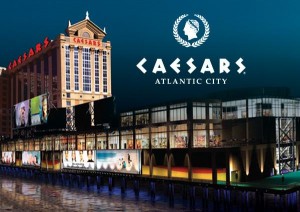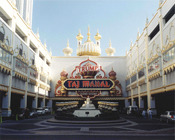One of the benefits of Donald Trump‘s current ubiquity is that it has belatedly spurred the press into debunking the myth that he was a successful casino operator in Atlantic City. A particularly damning Associated Press story connects the dots among the  subcontractors who got stiffed while working on Trump Taj Mahal and reveals a system pattern, suggestive of a calculated strategy by Trump, not mere fecklessness. Heck, Trump laid it out for all to see in his book, Trump: The Art of the Deal. “You have to be very rough and very tough with most contractors or they’ll take the shirt right off your back,” he scribbled. Built on a sinkhole of high-interest, junk-bond debt, the Taj went bankrupt the year after it opened but it was the subcontractors who took it on the chin. In the bankruptcy, the contractors got a third of what they were owed, with the promise of another 50 cents on the dollar somewhere down the road, presuming their business hadn’t already been obliterated by Trump’s shortchanging of them.
subcontractors who got stiffed while working on Trump Taj Mahal and reveals a system pattern, suggestive of a calculated strategy by Trump, not mere fecklessness. Heck, Trump laid it out for all to see in his book, Trump: The Art of the Deal. “You have to be very rough and very tough with most contractors or they’ll take the shirt right off your back,” he scribbled. Built on a sinkhole of high-interest, junk-bond debt, the Taj went bankrupt the year after it opened but it was the subcontractors who took it on the chin. In the bankruptcy, the contractors got a third of what they were owed, with the promise of another 50 cents on the dollar somewhere down the road, presuming their business hadn’t already been obliterated by Trump’s shortchanging of them.
A characteristic scenario was for contractors to stop being paid for finished work, but to keep at it with the enticement that a check would arrive ‘in two weeks.’ (Needless to say, it didn’t.) “Desperate for cash, contractors became easy targets for a new offer from Trump: Agree to less than they billed, and he’d pay the lower amounts immediately,” writes The AP’s Bernard Condon. It was both vile and brilliant. One subcontractor, who installed the Taj’s signature minarets, threatened to confiscate them but, alas, didn’t. (That would have been speaking a language Trump understands.) Even the late Patrick McGahn, who Trump hired to club the subcontractors into submission like so many baby seals (“Anyone who can afford home health care doesn’t need our money.”) had to sue The Donald for back pay.
Through it all, Trump kept up a steady stream of his trademark bluster. “I have a lot of money and the Taj has a lot of money” was among his empty claims. Also true to form was his pattern of self-dealing, giving himself a contract to manage the bankrupt Taj, and later extracting $82 million from Trump Hotels, Casinos & Resorts for salary, fees and bonuses, even though the company never turned a profit. When it comes to looking out for Number One, nobody bests Donald Trump.
* The last thing the Boardwalk needs, aside from a Trump comeback, is the sight of picket lines. Caesars Entertainment evidently came to the same conclusion, reaching a wee-hours settlement with Local 54 of Unite-Here and avoiding a strike. “Caesars … is proud  of the investments it has made to contribute to Atlantic City’s revitalization and will continue to help drive the city’s revival,” said Caesars Atlantic City President Kevin Ortzman. For his part, Local 54 prexy Robert McDevitt fired a warning shot at Carl Icahn: “We are glad that Caesars Entertainment recognized the importance of fair wages and benefits to the workers in Atlantic City. I hope that Tropicana and Taj Mahal get the message.” Tropicana Entertainment CEO Anthony Rodio has until midnight to cut a deal with Local 54 or he’ll wake up to picketers at Icahn’s two properties … hardly what the convalescent Taj needs.
of the investments it has made to contribute to Atlantic City’s revitalization and will continue to help drive the city’s revival,” said Caesars Atlantic City President Kevin Ortzman. For his part, Local 54 prexy Robert McDevitt fired a warning shot at Carl Icahn: “We are glad that Caesars Entertainment recognized the importance of fair wages and benefits to the workers in Atlantic City. I hope that Tropicana and Taj Mahal get the message.” Tropicana Entertainment CEO Anthony Rodio has until midnight to cut a deal with Local 54 or he’ll wake up to picketers at Icahn’s two properties … hardly what the convalescent Taj needs.
While terms of the Caesars/Unite-Here pact are being kept under wraps (no doubt in part to keep up the pressure on Icahn), The Press of Atlantic City enumerated workers’ wish list: “The union has said it seeks restoration of a week or more of paid vacation  relinquished in 2011. They also want a wage increase of $3 per hour, phased in in 60-cent increments over five years, and employer contributions to the union’s health fund sufficient to keep benefits at current levels.” Hardly outrageous demands, considering that operating profits are skyrocketing. To drive the point home, McDevitt likened casino executives to Communist commissars, telling Forbes, “We’re not in a Stalinist state where you can force workers to work for whatever you say.” Aside from Caesars, the union does enjoy friendly relations with Borgata, the Golden Nugget and Resorts Atlantic City, all of which have been spared strike threats.
relinquished in 2011. They also want a wage increase of $3 per hour, phased in in 60-cent increments over five years, and employer contributions to the union’s health fund sufficient to keep benefits at current levels.” Hardly outrageous demands, considering that operating profits are skyrocketing. To drive the point home, McDevitt likened casino executives to Communist commissars, telling Forbes, “We’re not in a Stalinist state where you can force workers to work for whatever you say.” Aside from Caesars, the union does enjoy friendly relations with Borgata, the Golden Nugget and Resorts Atlantic City, all of which have been spared strike threats.
Incidentally, if you’re wondering what became of Revel, so are we. A vast cone of silence has descended over the megaresort since Glenn Straub missed his June 15 deadline for reopening date. If Stockton University ever wants to present a class in how not to open a casino-hotel, Straub is giving them textbook material.
* Steve Wynn won’t like this: He wants 500 gambling tables for Wynn Palace Cotai.  He’s likelier to get 250, per governmental decree. Sanford C. Bernstein analysts expect Wynn to — no, not have another fit of apoplexy — make up the shortfall by moving 140 tables from Wynn Macau. Having limited Studio City Macau and Galaxy Macau II to 250 tables each, Macao‘s ruling regime can hardly make an exception for Wynn, especially one that would be adverse to home-grown operators. Amid the bad news was a silver lining: Overnight stays in Macanese hotels were up 4% last year, a good augury at a time when thousands more hotel rooms are heading for the market with all deliberate speed.
He’s likelier to get 250, per governmental decree. Sanford C. Bernstein analysts expect Wynn to — no, not have another fit of apoplexy — make up the shortfall by moving 140 tables from Wynn Macau. Having limited Studio City Macau and Galaxy Macau II to 250 tables each, Macao‘s ruling regime can hardly make an exception for Wynn, especially one that would be adverse to home-grown operators. Amid the bad news was a silver lining: Overnight stays in Macanese hotels were up 4% last year, a good augury at a time when thousands more hotel rooms are heading for the market with all deliberate speed.

